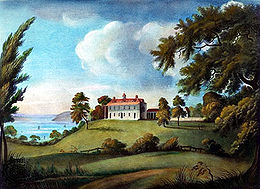Alexander Robertson (artist)
Alexander Robertson (1772-1841) was a Scottish-American artist. In the 1790s he founded the Columbian Academy of Painting in New York with his brother Archibald Robertson.
Early life


Robertson was born in Monymusk, near Aberdeen,[2] Scotland in 1772.[1][3][nb 1] His father, William Robertson,[4] was a draftsman and architect. Alexander was the middle of three artistic brothers; the others were Archibald and Andrew.[2]
Education
Robertson, who was a miniaturist, studied art in Scotland and then in London at the Royal Academy of Art.[4][5] He was also taught by his brother Archibald.[6]
Career
Robertson painted miniature portraits and landscapes,[2] influenced by William Sawrey Gilpin. He engraved, including topographical engravings. Archibald and Alexander collaborated on works, like the engravings.[6]
With his brother, Archibald, Robertson came to the United States to teach art at the invitation of several wealthy individuals.[1] Archibald arrived in 1791,[6] and Alexander joined his brother in the autumn of 1792.[5] In the 1790s the brothers established the Columbian Academy of Painting in New York[1] on William Street.[4] It was one of the country's first art schools. Their students included John Vanderlyn, Francis Alexander, and, rare for the time, a woman miniaturist named Ann Hall.[2] Alexander taught painting and drawing.[2] The brothers taught art to amateur and professional students with a wide variety of mediums and subjects. Their methods were based upon those taught in European and British art schools at that time.[6]
Around 1800 Alexander drew an illustration of Mount Vernon in Virginia, home of George Washington. This work was engraved by Francis Jukes of London shortly thereafter.[7][8]

Robertson opened his own art school in 1802.[2][6] The Columbian Academy of Art was renamed the Academy of Painting, which continued to be managed by Archibald.[6][nb 2]
Robertson exhibited at the American Academy of the Fine Arts (AAFA) in New York and was made director in 1816.[2][4] Both of the Robertson brothers were active in the management of the AAFA.[6] From 1817 to 1825 Alexander was the school's secretary. He was the curator from 1820 to 1835.[4][5] In 1821 he became an honorary member of the Academy of Fine Arts in South Carolina.[2]
Robertson traveled along the Mohawk and Hudson rivers and captured the landscape and towns in a travel sketchbook of pen and ink drawings. According to Elizabeth Allen, "Robertson's stylized approach reveals a preconceived notion of what a landscape should look like, based upon his exposure to the topographical tradition of Great Britain. It was up to the next generations of American landscape artists to free themselves from the restraints of that tradition to produce drawings that were more spontaneous and more faithful to nature."[9]
Personal life
Robertson married Miss Provost, who was the niece of Bishop Provost.[2]
Death
Robertson died in New York in 1841.[1][3]
Collections
His works are in the following collections:
- Albany Institute of History & Art[10]
- British Library[1]
- Brooklyn Museum of Art[11]
- Metropolitan Museum of Art[12]
- Smithsonian Institution[3]
Notes
References
- ^ a b c d e f Alexander Robertson (1772-1841). Archived 2014-08-22 at the Wayback Machine Art & Architecture of New Jersey. Retrieved August 21, 2014.
- ^ a b c d e f g h i j William Dunlap (1834). History of the Rise and Progress of the Arts of Design in the United States. George P. Scott and Company, Printers. pp. 425–426.
- ^ a b c William Beekman, by Alexander Robertson. Smithsonian Institution. Retrieved August 21, 2014.
- ^ a b c d e f Kevin J. Avery; Metropolitan Museum of Art (New York, N.Y.) (1 January 2002). American Drawings and Watercolors in the Metropolitan Museum of Art. Metropolitan Museum of Art. p. 338. ISBN 978-1-58839-060-8.
- ^ a b c Alexander Robertson biography. Smithsonian Institution. Retrieved August 21, 2014.
- ^ a b c d e f g Kevin J. Avery; Metropolitan Museum of Art (New York, N.Y.) (1 January 2002). American Drawings and Watercolors in the Metropolitan Museum of Art. Metropolitan Museum of Art. p. 102. ISBN 978-1-58839-060-8.
- ^ Mount Vernon Hand coloured engraving
- ^ Alexander Robertson
- ^ Elizabeth K. Allen (January 1, 1998). Open-air Sketching: Nineteenth-century American Landscape Drawings in the Albany Institute of History and Art. SUNY Press. p. 6. ISBN 978-0-939072-13-2.
- ^ Alexander Robertson. Albany Institute of History and Art. Retrieved August 21, 2014.
- ^ Alexander Robertson. Brooklyn Museum of Art. Retrieved August 21, 2014.
- ^ Alexander Robertson. Metropolitan Museum Collections. Retrieved August 21, 2014.
External links
![]() Media related to Alexander Robertson at Wikimedia Commons
Media related to Alexander Robertson at Wikimedia Commons
- 1772 births
- 1841 deaths
- 18th-century Scottish painters
- Scottish male painters
- 18th-century American painters
- American male painters
- 19th-century American painters
- Scottish engravers
- American engravers
- People from Aberdeenshire
- Scottish emigrants to the United States
- Portrait miniaturists
- 19th-century male artists
